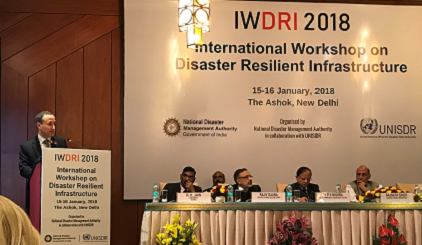
Head of UNISDR, Robert Glasser, speaking today at opening of international workshop on disaster resilient infrastructure in New Delhi. Photo UNISDR
NEW DELHI, 15 January, 2018 - India’s Home Minister Mr. Rajnath Singh, today expressed India’s desire to lead a global coalition which will work towards reducing damage to critical infrastructure as called for by the Sendai Framework for Disaster Risk Reduction.
Mr. Singh said: "The way we build our infrastructure today will either build risk or resilience for the future generations. We need to bring to bear tremendous foresight and rigour to ensure that all our new infrastructure is built to withstand the hazards of the present as well as the future."
He was inaugurating a two day International Workshop on Disaster Resilient Infrastructure (IWDRI) in New Delhi today attended by disaster risk reduction experts from several institutions and over 20 countries.
The Home Minister cited climate change as a threat to critical infrastructure. “There are parts of the country that are experiencing heavy rain fall and floods in spite of the fact that overall seasonal rainfall is below normal. These changes will pose new challenges for how we design our infrastructure for the future,” he said.
Given that infrastructure systems are inter-connected globally and disruptions in one part of the world could impact another, it was important that all stakeholders came together to address the challenges.
The two-day workshop is organised by the National Disaster Management Authority (NDMA) in collaboration with United Nations Office for Disaster Risk Reduction (UNISDR).
Mr. Robert Glasser, the UN Secretary-General’s Special Representative for Disaster Risk Reduction, said the workshop was a chance to examine in-depth target (d) of the Sendai Framework which seeks to “substantially reduce disaster damage to critical infrastructure and disruption of basic services, among them health and educational facilities, including through developing their resilience by 2030.”
He reflected that 2017 has been another remarkable year for disaster losses and laid bare the fragility of our planet and the built environment in a way not seen for many years.
Mr. Glasser said that the insurance companies estimate that economic losses from last year were the worst in many years. “Preliminary figures indicate that 11,000 people lost their lives and that direct economic losses in the United States alone were over US$300 billion”, he said.
Mr. Glasser said that the pace of urbanization taking place in India and around the world presents an opportunity on a grand scale, to avoid creating new risk and to reduce future losses.